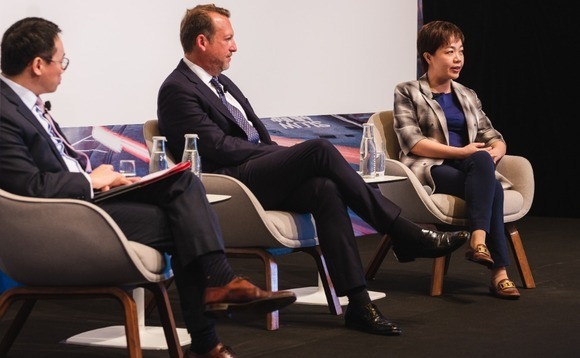
SPAC regime reflects HK's cautious approach to expansion - AVCJ Forum

The Hong Kong Stock Exchange (HKEx) is positioning its soon-to-launch special purpose acquisition company (SPAC) regime as part of efforts to broaden its appeal in terms of capital markets tools and geographies. At the same time, executives are wary of going “too freestyle.”
"We want to make sure we are balancing the interests of different players – promoters with financial incentives, SPAC investors, PIPE investors in the de-SPAC, and other investors," Christina Bao, a managing director and co-head of sales and marketing at HKEx, told the AVCJ Private Equity & Venture Forum. "We want to put safeguards around our SPAC regime."
Bao referenced stipulations regarding deal size and promoter qualifications. However, some industry participants focus on other aspects of the draft regulations, openly questioning whether Hong Kong – known to be sensitive about reverse mergers – wants SPACs to become a mainstream tool.
Notably, unlike the US and Singapore, SPAC investors are only able to redeem their shares once a merger is announced if they vote against the consummation. This could undermine sponsor confidence in the ability to get deals done.
There was opposition to this proposed rule, on the grounds that it runs contrary to the investor mindset. In the US, hedge funds regard SPACs as an opportunity to lend money to a company for the period it takes to find a merger target, at low or no interest, and get a warrant in return. They commit knowing they will receive the warrant, which converts into equity, even if they redeem.
Without getting into specifics – and noting that his firm has yet to sponsor a SPAC – Alex Emery, Asia head of Permira, endorsed the use of safeguards.
"With SPACs, you bring in a lot of additional players, and from our perspective, in the context of exits, we do care deeply about who is going to be the next owner of a business," he said. "It's not only about reaching a financial goal; it is also about making sure the portfolio company has the right set of shareholders to support ongoing growth."
One of the considerations for HKEx, Bao added, is that SPACs don't work for everyone. There must be a reason for a company to merge with a SPAC, especially if it qualifies for a normal IPO. This view was echoed by Sudhir Variyar, a managing director and deputy CEO at Multiples Alternate Asset Management, when explaining why few Indian companies have opted for SPAC mergers.
"They have been approached. The question has been, if the company is large enough and can do an IPO, and it is reasonably ready, why would you give up the promote and not do the IPO yourself?" he said. "Given the IPO market is efficient, IPOs are getting done quickly, and some companies are IPO-ready from a governance perspective, they don't have a challenge in pursuing an IPO."
The strength of India's domestic market, plus the longstanding appeal of the US, was also cited as a reason for companies not thinking seriously about secondary listings in Hong Kong. Variyar accepted there might – one day – be circumstances in which Indian consumer-related businesses are better understood by investors familiar with and close to other developing markets.
Emery added that the companies Permira backs nearly always have a geographic anchor, which ultimately leads them to list on a particular exchange. Typically, the internal debate is not between IPO locations but whether a public market exit makes more sense than a trade sale.
"It's interesting that Hong Kong has the potential to attract businesses with a more regional footprint and historically, that's the first point of consideration, the geographic anchor," he said. "And then there is certainty, liquidity, what exchanges have comparable companies, so you get the right coverage for that sector. Those are all factors we consider."
Bao highlighted another factor: the ability to refinance at a better valuation after the IPO. She argued that Hong Kong represents a unique proposition in this respect as the only exchange that combines international and Chinese investors. Broader investor coverage can lead to improved valuations – and there is certainly demand in mainland China.
"Historically, people don't think that Chinese investors would be interested in an Indian name or an Indonesian name. But when I was traveling in the mainland in the past couple of months, I met not only issuers but also a lot of the buy-side," Bao said.
"I kept hearing they are thinking about diversifying their portfolios, not just in terms of private equity investment, but also in terms of mutual funds. There is an urge to participate in investments in other jurisdictions. The fundamentals are getting better in terms of investor appetite from China."
Latest News
Asian GPs slow implementation of ESG policies - survey
Asia-based private equity firms are assigning more dedicated resources to environment, social, and governance (ESG) programmes, but policy changes have slowed in the past 12 months, in part due to concerns raised internally and by LPs, according to a...
Singapore fintech start-up LXA gets $10m seed round
New Enterprise Associates (NEA) has led a USD 10m seed round for Singapore’s LXA, a financial technology start-up launched by a former Asia senior executive at The Blackstone Group.
India's InCred announces $60m round, claims unicorn status
Indian non-bank lender InCred Financial Services said it has received INR 5bn (USD 60m) at a valuation of at least USD 1bn from unnamed investors including “a global private equity fund.”
Insight leads $50m round for Australia's Roller
Insight Partners has led a USD 50m round for Australia’s Roller, a venue management software provider specializing in family fun parks.








